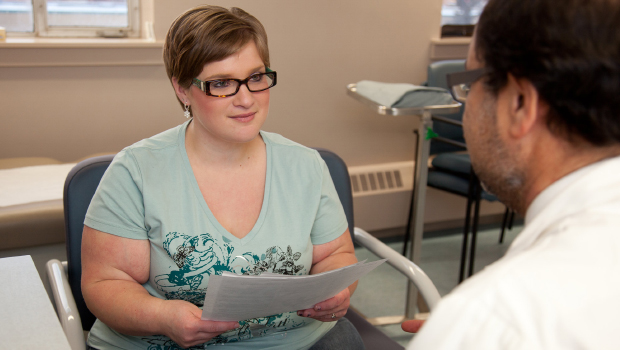Comparing different types of bariatric surgery: What’s right for you?

Photo credit: Obesity Canada
Based on their studies, KPWHRI researchers explain the risks and benefits
Bariatric surgery — also called metabolic or weight-loss surgery — is an operation that changes the digestive system. It limits the amount of food that can be taken in during a meal and changes the body's signals — for example, about hunger.
Studies from Kaiser Permanente Washington Health Research Institute (KPWHRI) looked at the safety of bariatric surgery and its effect on weight and diabetes risk for up to 5 years after the operation. The research was led by Senior Investigator David Arterburn, MD, MPH, who is an internal medicine physician with the Washington Permanente Medical Group, collaborating with KPWHRI Project Manager Jane Anau. The studies used data from patients across the country, including from Kaiser Permanente Washington.
What are the main types of bariatric surgery?
- In gastric bypass, also called a Roux-en-Y procedure, a surgeon uses part of the upper stomach to create a pouch that holds a small amount of food. The surgeon attaches this pouch to the small intestine. This procedure limits the amount of food that a person can eat at one time and also causes the body to absorb fewer calories.
- In sleeve gastrectomy, a surgeon removes a large part of the stomach, which limits the amount of food a person can eat.
- In adjustable gastric banding, a surgeon places a band around the upper part of the stomach to limit how much a person can eat.
Adjustable gastric banding is now less common because research, including from KPWHRI, shows that gastric bypass or sleeve gastrectomy give better results for weight loss that is maintained over time. In one study, both adults and teenagers had more weight loss with the other two surgery types than with adjustable gastric banding. Adults also had a higher chance of improvements in type 2 diabetes with gastric bypass or sleeve gastrectomy than with adjustable gastric banding. Patients who had gastric banding had the highest risk of needing another surgery.
How do the types of bariatric surgery compare?
Here's a summary of findings from studies conducted by Arterburn, Anau, and their colleagues that compared the most common surgeries with data from 2005 to 2015. The results were the same across race and ethnicity groups.
If your main concern is weight loss:
- Gastric bypass was the best option for losing weight and maintaining the weight loss.
- Adults who had gastric bypass lost more weight at the first year than those who had sleeve gastrectomy.
- At 5 years after surgery, adults who received gastric bypass lost about 19 pounds more than those who had sleeve gastrectomy.
- Adults who had gastric bypass lost more weight at the first year than those who had sleeve gastrectomy.
- For adolescents and teens ages 12 to 19 years old, gastric bypass was also the best option for weight loss and weight maintenance.
- For this group of young people, the research found that gastric bypass decreased body mass index (BMI) by 31%. Sleeve gastrectomy reduced BMI by 29%.
- The reduction in BMI was maintained up to 3 years after surgery.
- The study used BMI because young people are still growing taller. For this group, BMI is a better measurement than change in weight, as it relates a person’s weight to their height.
- For this group of young people, the research found that gastric bypass decreased body mass index (BMI) by 31%. Sleeve gastrectomy reduced BMI by 29%.
If your main concern is diabetes:
- Gastric bypass and sleeve gastrectomy were more effective than adjustable gastric banding at improving the control of diabetes.
- With any bariatric surgery, diabetes went away, at least for some time, for most people with type 2 diabetes.
- For 86% of people who had gastric bypass and 84% who had sleeve gastrectomy, at some point in the 5 years after surgery, their records showed normal blood sugar and no prescriptions for diabetes medications.
- For 65% of people with adjustable gastric banding, diabetes went away at some point in the 5 years after surgery.
- For 86% of people who had gastric bypass and 84% who had sleeve gastrectomy, at some point in the 5 years after surgery, their records showed normal blood sugar and no prescriptions for diabetes medications.
- Bariatric surgery did not completely cure diabetes: In the studies, for more than half of people who had surgery, type 2 diabetes returned — for example, as poorly controlled blood sugar.
- For people who had gastric bypass surgery, diabetes was slightly less likely to return than for people who had sleeve gastrectomy.
- For people who had gastric bypass surgery, diabetes was slightly less likely to return than for people who had sleeve gastrectomy.
- The researchers did not have enough data to look at how bariatric surgery affected type 2 diabetes in adolescents and teens.
If your main concern is the safety of the surgery:
- Bariatric surgery has a low risk of death.
- Overall in the studies, fewer than 1 in 100 people died — for any reason at all — within 5 years of either gastric bypass or sleeve gastrectomy surgery.
- In a comparison among adults with severe obesity, those who had either gastric bypass or sleeve gastrectomy had a significantly lower risk of dying within 5 years than those who did not have bariatric surgery.
- Overall in the studies, fewer than 1 in 100 people died — for any reason at all — within 5 years of either gastric bypass or sleeve gastrectomy surgery.
- Gastric bypass patients had a higher risk than sleeve gastrectomy patients of needing another operation or intervention related to their bariatric surgery.
- At 5 years after surgery, 12% of gastric bypass patients had a procedure related to their surgery compared to 9% of sleeve gastrectomy patients.
- Gastric bypass patients also had a higher risk than sleeve gastrectomy patients of other events such as hospitalization.
- People who have gastric bypass surgery have a higher chance of needing more follow-up treatments because it is a more complex surgery than sleeve gastrectomy.
- At 5 years after surgery, 12% of gastric bypass patients had a procedure related to their surgery compared to 9% of sleeve gastrectomy patients.
- Not enough data were available to study these same safety questions in adolescents and teens.
How should this information be used?
All treatment options for severe obesity should be discussed with a medical professional. No matter the options, exploring shared decision-making with a trusted health care provider is a good place to start.
To learn more about this research, see Our findings — PCORnet Bariatric Study.
Live Healthy: Top Topics
research

Weight loss lasts long after bariatric surgery
Diverse Kaiser Permanente patients maintained weight better after gastric bypass than after sleeve gastrectomy
healthy findings blog

Best weight-loss surgery for diabetes and severe obesity?
Watch video on latest results from PCORnet Bariatric Study. (Spoiler alert: Bypass, not sleeve.)
Live healthy

What is shared decision-making?
An explanation from KPWHRI researchers about discussing treatment options with a medical provider.
profile

What motivates Dr. David Arterburn to study obesity?
He aims to reduce suffering from chronic illness. Plus, he's optimistic about research on body-weight regulation and on the psychology of weight-related behaviors.


